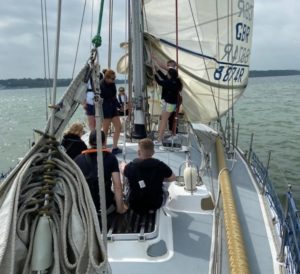As well as the easing of some of the restrictions on social gatherings, swimming pools being able to reopen and once again being able to go inside cafes and restaurants, step 3 of the lockdown easing, that came into effect on May 17th, has also allowed schools to take children once again on overnight visits.
For many Year 6 children the opportunity to go away with their class and year group is almost a rite of passage as they conclude their time at primary school, so it has been great to see the enthusiasm that teachers and their schools have had to enable these visits to go ahead during the summer term. Some schools had visits planned that were due to begin on the 17th so there were some weeks of uncertainty before the easing of the restrictions was confirmed – but then some very happy children when they knew these visits could go ahead.
“It taught me resilience as at first there was no way I was going to do the activity, but my teacher and the instructor persuaded me and I loved conquering my fear” said one Year 6 child from Holy Trinity Junior School in Wallington.
Of course some have missed out on opportunities that were planned prior to 17th May but schools have been very creative in planning other events and experiences to make sure that children don’t miss out completely. These have included activity days at a number of local centres and day trips to the beach. A teacher who asked for some advice when planning a day trip to West Wittering beach said afterwards:
“Our trip to West Wittering Beach was a fantastic day out with our Year 6 children. For some, it was the first time they had been to the beach and they were fascinated by the sea and the sand. We spent the day paddling in the sea, building sandcastles, having a picnic lunch and playing beach games, such as volleyball. After more than a year of restrictions and minimal school trips, it was lovely to see the children enjoying the fresh air and creating memories with their friends, before moving onto secondary school”.
While the compulsory fieldwork element of the GCSE Geography curriculum has been relaxed for this year, this doesn’t seem to have dampened the enthusiasm for fieldwork either. Both teachers and students see this as the highlight of their subject. In a ‘normal’ year the hills, valleys and coast of Wales are popular fieldwork destinations, but the different rules and later dates for easing in Wales have meant that some schools have had to plan to visit different locations this time.
The range of events and visits that have taken place already since 17th May is fantastic, primary schools have been running sleepovers in the school grounds or buildings again despite ongoing limitations on how these can be organised, and students in special schools are once again benefitting from the broader curriculum that these schools offer; students from the Limes College are taking part in two week long trips with the Tall Ships Trust, taking responsibility for crewing a 22m long yacht and living and sleeping on board for a week, and many secondary school students are able to undertake the expeditions that are a highlight of completing their Duke of Edinburgh’s Awards.
It has been challenging to unravel the many changes to the Government guidance and Mick Bradshaw our Outdoor Education Adviser has been working with schools to keep them up to date with these, and when there have been grey areas or conflicts between guidance issued by the DfE and other departments to try and work out what has been intended; should schools only have children from one bubble on a coach? How many children can sleep in the same tent or dormitory? -and many other conundrums! This year has certainly brought new questions and aspects to planning visits but has shown how much these activities and events are a vital part of the curriculum.
There are still some challenges and uncertainties surrounding planning future visits, but hopefully these will be resolved over the summer and the new school year will enable schools to offer everything that they have done in previous

